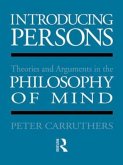Many critics have claimed that existentialism has not produced any ethics, as distinct from the moralistic assertions of its individual proponents. Challenging this view, Professor Olafson demonstrates that Sartre, Heidegger, and Merleau-Ponty indeed worked out a powerful ethical theory and that their positions must be understood as deriving from a voluntarist concept of moral autonomy that can be traced beyond Nietzsche and Kant to certain tendencies in late-medieval thought. He demonstrates that a broad parallelism exists between developments in ethical theory among Continental philosophers of the phenomenological persuasion and the more analytically inclined philosophers of the English-speaking world.
Hinweis: Dieser Artikel kann nur an eine deutsche Lieferadresse ausgeliefert werden.
Hinweis: Dieser Artikel kann nur an eine deutsche Lieferadresse ausgeliefert werden.








